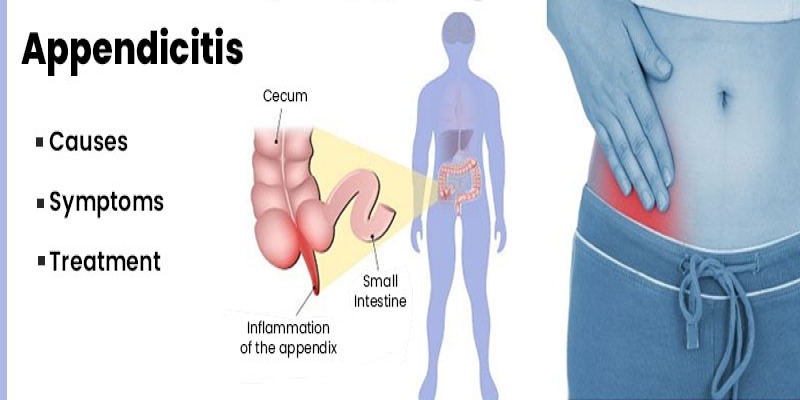Knowing The Red Flags for Appendicitis
2019-02-11 / RG STONE HOSPITAL / Appendicitis

It is observed that 8 out of every 10 people fear of getting affected by appendicitis once in their entire lifetime. The disease is primarily associated with stomach pain and can also be felt in your sides or back. With a motion like when you move, walk or even cough, the pain may even worsen causing chronic pain.
The symptoms for appendicitis vary in both adults and teens, so you need to get deeply into the knowledge about this disease. If you have been experiencing significant pain that doesn’t fade even after 4 hours, then you should definitely see a doctor and get diagnosed for appendicitis.
A brief profile of Appendicitis:
Appendicitis can be described as the inflammation of appendix that is caused by the blocking of the appendix, enlarged lymphoid follicles, worms, trauma or tumors. With the blocked appendix, bacteria can multiply inside the blockage causing the appendix to rupture or form pus. If the pain remains untreated then it may gradually worsen and
What are The Symptoms of Appendicitis?
Signs and Symptoms of Appendicitis Include:
- Sudden pain that emerged from your navel and radiates to the lower right abdomen.
- Sudden pain that starts from the right side of the lower abdomen
- Pain that worsens if you cough, walk or make other jarring movements
- Low-grade fever that may worsen as the illness progresses
- Constipation or diarrhea
- Abdominal bloating
- Nausea and vomiting
The intensity and type of pain may vary depending on the position of your appendix and your age. In pregnant women, the pain may seem to come from the upper side as an appendix is on the higher side during pregnancy.
If you see any of these symptoms in your day to day life, it is advised to consult a doctor as soon as possible. Without treatment, there can be serious complications that maybe really fatal for the overall body functioning.
If you see any of these symptoms in your day to day life, it is advised to consult a doctor as soon as possible. Without treatment, there can be serious complications that maybe really fatal for the overall body functioning.
What are The Complications?
If not treated in time, Appendicitis can cause serious complications, such as:
• A Ruptured Appendix: A ruptured appendix may cause serious infection that can lead to peritonitis. The condition requires immediate surgery to remove the appendix and clean your abdominal cavity as without surgery this can turn out to be life-threatening.
• A Pocket of Pus that is formed in the abdomen: You may develop a pocket of infection (abscess) if your appendix bursts.
Appendicitis Diagnosis :
For diagnosing Appendicitis, the doctor may perform many physical tests like touching your abdomen over your skin to feel tenderness or any swelling over your skin. He can also perform several tests like Urinalysis, pelvic exams, pregnancy tests to detect ectopic pregnancies or some other issues, chest X-ray to determine lower lobe pneumonia and other tests like CBC.
It is advisable to get diagnosed at the initial stages so that you don't have to go through the pain in the later stages.
It is advisable to get diagnosed at the initial stages so that you don't have to go through the pain in the later stages.
Surgery and Recovery of Appendicitis :
People in the age group of 10-35 are more prone to Appendicitis than any other individual. The surgical methods may include appendectomy and laparoscopy. In some rare cases, appendicitis may even get better without surgery. This is only an option if your abdominal pain is minimal and your diagnostic tests are normal.
In such cases, the appendicitis treatment plans may include antibiotics and a liquid diet until the symptoms are fully resolved. In the case of laparoscopy, the surgery is less invasive, so the recovery time tends to be shorter. While with appendectomy you need to stay a little longer in the hospital.
You are more likely to experience tenderness and bruising after your operation.
Stay hydrated and eats fiber rich foods so that you get well soon.
You are more likely to experience tenderness and bruising after your operation.
Stay hydrated and eats fiber rich foods so that you get well soon.
Categories
Hernia Repair
Appendicitis
Piles
Urological Treatment
Hernia treatment
Enlarged Prostate (BPH)
Gall Bladder Stone
Urinary / Kidney Stone
Vitamins
Indian Health Care System
Exercise
Obesity
Female Urinary Incontinence
Single Incision Laparoscopic Surgery (SILS)
Kidney Cancer
Bladder Cancer
Ovarian cancer
Nephrology
Bariatric Surgery
Kidney Function Test
Female Urology
Radiation Therapy

